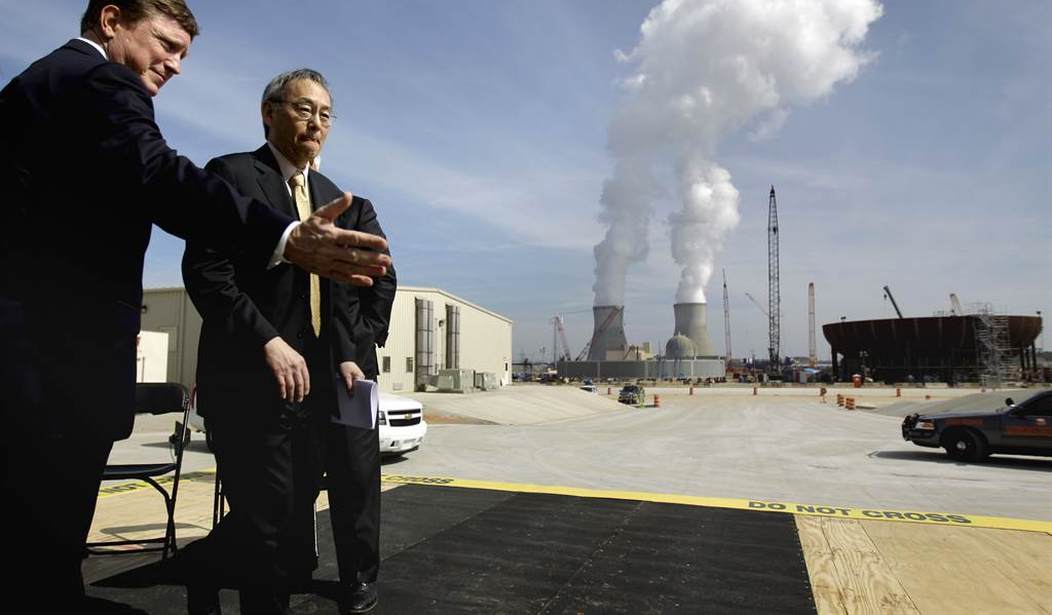In the Wonk'd section of April's Townhall Magazine, Nicolas Loris and Jack Spencer of the Heritage Foundation explain why nuclear energy has much potential to cleanly and affordably power the world.
The first new nuclear reactors in years are being built, but environmentalists and opponents of nuclear power are already writing its obituary. It’s too expensive. Natural gas is much cheaper. They take too long to build. We don’t have a solution for the waste they produce.
Though there’s no need for a funeral march, they have a point.
To get the elephant out of the room right away, opponents say cheap natural gas prices nuclear power out of the market. But while the ease with which producers can extract natural gas is really unlike any other time before, we’ve seen low natural gas prices before. But these are questions best left to investors, not politicians or activists.
Building a new reactor does in fact take entirely too long. By the time a new application moves through the Nuclear Regulatory Commission’s licensing and operating permits, we could watch at least two winter Olympics go by.
Further, and perhaps more importantly, the current system stifles innovation. Right now, America has 100 operating large lightwater 1,000 megawatt reactors that provide about 20 percent of America’s electricity. And although they provide consistently efficient, clean and inexpensive electricity for 60 to 80 years, the upfront costs are significant.
Yet, innovators are developing promising new reactor technologies that have several potential advantages. They’re smaller, so while they’ll power fewer homes, they’ll have less upfront capital costs. They can be built in remote locations, and some of them can be buried underground. Others have little to no waste.
Recommended
The problem is we have a regulatory scheme in place that only permits one kind of technology—the large lightwater reactors we’ve used for the past 50 years. Bringing new nuclear reactors online are instead handled with subsidies, loan guarantees, and other taxpayer-funded inducements granted to a select number of competitors. Though we may see a handful of new reactors reach the market this way, it’s hardly a strategy for vibrant competition (unless we’re talking about a three-legged race).
Policymakers should stop resorting to subsidies. We need instead the right regulatory system—one that doesn’t shirk on safety or diligence but creates a framework to drive competition. Policymakers should work with the NRC to create a fast-tracking program that would not compromise the safety of the permitting process.
For instance, applications that meet certain requirements, such as using a nuclear technology already approved and licensed by the NRC or building on or adjacent to an existing reactor site, could move through the regulatory structure in half the time.
The NRC should also develop regulations to allow other types of reactor technologies to be efficiently licensed. Not only could this spark a technological revolution and create more availability for an affordable, reliable energy source, it could spark competition within the nuclear industry, and lead to the creation of large lightwater reactors that could lower costs.
But we still need to figure out what to do with nuclear waste. Nuclear waste policy has been broken for decades. The problem is that Washington took full responsibility for commercial waste disposal. This removed any incentive for the private sector to develop a more efficient solution and instead left it to politicians to decide how best to deal with the waste. It also meant subjecting the entire process to politics.
The result: the federal government hasn’t held up its end of the bargain, failing miserably to collect any used fuel, which now sits safely on-site in interim storage casks.
Though it may be foreign in Washington, the solution to managing and disposing nuclear waste might just be found in the free market. Making waste producers responsible for waste management would remove politics from a decision-making process that should reside solely with the private sector. Such a system would allow utilities to internalize the actual costs of waste management and build business models that include those costs, creating strong incentives to pursue economical waste management solutions that meet customers’ needs and government safety standards.
Nuclear energy has much potential to cleanly and affordably power the world. Its future is simply too important to leave to politicians. •
























Join the conversation as a VIP Member